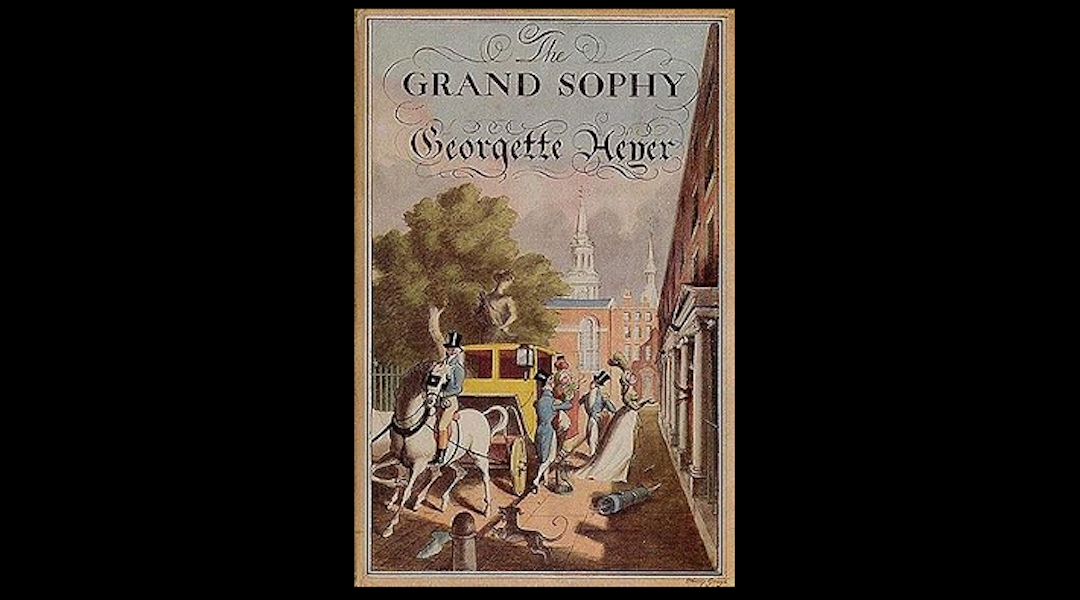Publisher removes Jewish stereotypes from classic Georgette Heyer romance novel
Heyer pioneered the Regency romance genre and subsequently inspired legions of authors, such as “Bridgerton” novelist Julia Quinn

“The Grand Sophy” was first published in 1950. (Wikimedia Commons)
(JTA) — The U.S. publisher of Georgette Heyer, who is widely considered the originator of the historical romance genre, has modified part of one of her books that includes Jewish stereotypes.
The New York Times reported last week that publisher Sourcebooks worked with an array of sensitivity readers and experts on modifying “The Grand Sophy,“originally published in 1950, before releasing new versions of multiple Heyer books this year.
Heyer’s books — which also pioneered the Regency romance genre, and subsequently inspired legions of authors, including Jewish “Bridgerton” novelist Julia Quinn — have sold millions around the world. In “The Grand Sophy,” the main character interacts with a villainous moneylender named Goldhanger, who is a “thin, swarthy individual, with long, greasy curls, a semitic nose, and an ingratiating leer.”
The new Sourcebooks edition deletes the details about the moneylender’s appearance that have been associated with antisemitic stereotypes and changes the character’s name to Grimpstone. He is now described as a “thin individual with an ingratiating leer.”
Another revision gets rid of a reference to Jews being tight with “purse-strings.”
“We don’t want to throw off a 25-year-old who’s just discovering Heyer,” a senior vice president and editorial director at Sourcebooks told the Times. Sourcebooks did not respond to a Jewish Telegraphic Agency request for more detail on the revisions.
The Heyer estate asked Mary Bly, a romance novelist and literary scholar, to write introductions to the new versions. But the author’s estate did not want her to mention the offensive language and how it was changed, a stance that led Bly to quit the project.
The Heyer estate’s website states that her publisher in the United Kingdom, Penguin Random House, has decided “to leave the books as the author wrote them.”
“They do not endorse the language or depictions in some of these books, but encourage readers to consider the works critically and in their historical and social context,” a statement reads.
Heyer’s work is the latest among recent debates about revising old texts to fit contemporary language standards. Roald Dahl and Agatha Christie books were also modified earlier this year.
Sourcebooks began acquiring Heyer titles in 2007 and has sold over two million copies of Heyer books so far, but the Times reported that the publisher eyes an even larger audience. The Netflix adaptation of “Bridgerton,” which premiered in 2020, has become one of the streaming giant’s most-watched shows and reignited interest in the Regency romance genre.
This article originally appeared on JTA.org.
A message from our CEO & publisher Rachel Fishman Feddersen
I hope you appreciated this article. Before you go, I’d like to ask you to please support the Forward’s award-winning, nonprofit journalism during this critical time.
We’ve set a goal to raise $260,000 by December 31. That’s an ambitious goal, but one that will give us the resources we need to invest in the high quality news, opinion, analysis and cultural coverage that isn’t available anywhere else.
If you feel inspired to make an impact, now is the time to give something back. Join us as a member at your most generous level.
— Rachel Fishman Feddersen, Publisher and CEO